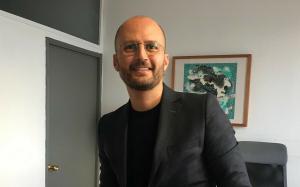Javier Álvarez: «Experiencing anxiety on a daily basis is useful and necessary»
Anxiety is a phenomenon that we associate with discomfort, discomfort and, sometimes, even despair. It makes sense that this should be so: it is one of the considered negative emotions, to the point that many people suffer from real anxiety problems and attend psychotherapy to overcome them.
However, this psychological element does not exist for its own sake. Precisely, if it is so universal it is precisely because even if we do not realize it, on many occasions it helps us, it works in our favor. Of this, among other things, he speaks to us our interviewee today, the psychologist Javier Álvarez Cáceres.
- Related article: "The 7 types of anxiety (characteristics, causes and symptoms)"
Interview with Javier Álvarez Cáceres: how does anxiety influence us?
Javier Álvarez Cáceres is a General Health Psychologist specialized in cognitive-behavioral therapy and with consultation in Malaga, where he treats individual patients and families and couples. In this interview we talk to him about one of the main reasons people go to the psychologist: anxiety.
In what ways can experiencing anxiety help us in our day-to-day lives?
Experiencing anxiety on a day-to-day basis, in addition to being useful, is necessary. Anxiety is what prepares us for the execution of a task or warns us of a danger.
Imagine doing any activity of daily life without a minimum of anxiety. When crossing a pedestrian crossing, we would not be "alert" to any unforeseen event. At work we would not be focused on the proper execution of the task. Driving, taking an exam ...
Not to mention anxiety in the face of danger. For example, in that pedestrian crossing that we mentioned earlier. If a driver did not see us and did not brake, anxiety would provoke a whole series of physiological responses that prepare for danger, pupil dilation, sweating to regulate temperature, hypervigilance, blood pressure muscles... That is, our body prepares to run and avoid an accident.
What makes anxiety, a resource that has evolved to help us survive, lead to an anxiety disorder?
We would find ourselves before three large groups. On the one hand, predisposing factors. Here the factors of personality, biology and parenting styles would be included.
Second are the triggers. Consumption of toxins and events in our life that cause anxiety, we are not being able to manage it and it becomes dysfunctional... family crises, labor crises, vital crises, interpersonal conflicts ...
Third are the maintenance factors. Here are the solutions that we have tried and have not worked, causing the anxiety to become chronic.
As a maintenance factor, it is important to highlight fear. Anxiety causes so much discomfort that it causes fear of the repetition of the discomfort, that fear of the repetition of the sensations is what in many cases causes it to become a vicious circle.
As a psychologist, what aspects of the way of life of Western people do you think can generate excess anxiety frequently?
It is a very good question, since we people are used to treating anxiety once the discomfort is very high, but we do not realize that prevention is very important.
Pathological anxiety is an indicator that something is not going well in our lives, it appears little by little, "We do not listen to it" and the discomfort is increasing, we continue not to listen to it and the discomfort continues to increase.
I think that the rhythm of life that we lead on a daily basis in the West is an "anxiety factory"; we get up running, we wake up with a certain level of anxiety, in many cases, we continue to accelerate during the day and go to bed with our heads “full” of thoughts about the next day.
To manage anxiety it is important to take care of sleep, food, sports and social and family relationships, something that we increasingly neglect in Western culture.
Do you think that today the fact of resigning to suffer anxiety problems is very normalized in society?
Rather than resign ourselves to suffering anxiety problems, what we are getting used to is not working ourselves, not take care of ourselves, not listen to our body and mind and see what is happening to us, what is causing us discomfort and anxiety.
Today, one of the most widely sold medications in the pharmacy are anxiolytics and antidepressants.
We live at such a fast pace of life that it is easier and more comfortable to take a pill than to work on us.
What are the anxiety disorders that you see in consultation?
The anxiety disorders What I see most in consultation are panic attacks and anxiety caused by problems in social relationships, couples and family.
Lately there has been a very significant increase due to COVID-19 of everything related to the decrease in the work, social and family area.
At the same time, there has also been a greater increase in consultations related to hypochondria.
From your point of view, what are the most useful psychotherapy techniques to help people with anxiety problems?
From my point of view, the cognitive behavioral therapy It is the most effective therapeutic model for treating anxiety disorders.
In addition, a higher percentage of success is obtained by integrating techniques from other models, such as Acceptance and Commitment or systemic ones. When addressing everything related to anxiety, it is necessary to intervene in three areas: physiological, cognitive and behavioral.
In the physiological, we intervene on all physical symptoms through relaxation techniques, visualization, breathing, normalization of symptoms ...
In the cognitive part, we intervene on the thoughts associated with the anxiety process, distinguishing between whether they are rational or irrational thoughts.
In the behavioral area we intervene from small exercises aimed at regaining control of our day to day, of our life.


